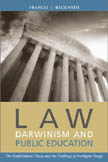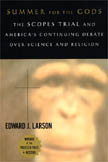
Access
Research
Network
|
|
Access |
ARN-Announce is the on-line announcement and information service of Access Research Network. ARN generates announcements to the current ARN Announce list as information becomes available. You have received this message because your email address was submitted to this list. Subscription and Unsubscription information is at the end of this message.
Click here for a text-only version of this document.
IN THIS ARN-ANNOUNCE:

Francis J. Beckwith
2003 (paperback edition), Roman & Littlefield Publishers, 185 pp.
I am not a big fan of legislation or legal action to force teachers to teach Intelligent Design. If a teacher is forced to teach something she thinks has no merit, it will probably be taught poorly. I am, however, a fan of legislation and legal action that promotes basic academic freedom for teachers and students, and am committed to developing materials on Intelligent Design that teachers want to use in such an environment.
As the Intelligent Design movement continues to gain momentum, we can expect the defenders of Darwinism try every possible legal and legislative maneuver to keep ID and criticism of Darwinism out of our schools. We have reported several cases recently where the academic freedom for students has been severely restricted by university professors. The Santorum Amendment and new Ohio Standards for Science Education are a two encouraging signs that academic freedom will prevail. But before it does, our higher courts will likely get involved, just as they did for the “creation-science” debates of the 1980’s.
Francis Beckwith has studied the legal, philosophic, and scientific issues carefully and concluded in his new book that Intelligent Design is not Creation-Science, and the outcome of the next round of court battles is likely to be much different than the battles of the 1980s—if we listen carefully to what the courts said in those cases.
At first glance this looks like another boring legal book that belongs on some dusty shelf in a law library. Don’t be fooled. The book presents one of the best overviews of the Intelligent Design movement available today. In the opening chapter Beckwith informs the reader that the purpose of the book is to answer one question: “If Intelligent Design was required or permitted to be taught in public schools, would it violate the Establishment Clause?” In order to answer the question Beckwith takes the reader through a fascinating history of the Intelligent Design movement, lessons learned from 75 years of creation/evolution legal battles, and a succinct summary of the scientific evidence for Intelligent Design.
What sets this work apart from some of the other ID books are the extensive research notes at the end of each chapter. For example, the Introduction is ten pages long followed by eleven pages of notes containing 87 references with full citations, additional commentary and web links where original source material can be located. Another nice feature is chapter summaries. If you don’t feel like wading through the legal details of Chapter 1 and 2, you can jump right to the chapter summary for the punch line.
The Introduction covers the rise of the Intelligent Design movement and establishes the academic credentials of the associated scholars. A capsule review of significant public ID events is then presented including the 1998 U.S. Civil Rights Commission hearing, the 1999 Kansas State Board of Education decision, the 2001 Congressional Santorum Amendment, and the 2002 Ohio Board of Education science standards.
Chapter 1 reviews the legal history of the debate from the 1925 Scopes Trial up through the 1982 McLean vs. Arkansas case. Beckwith starts by defining important terms such as creationism, evolution and intelligent design and asserts that most of the confusion over the teaching of origins in public schools results from the participants not clearly defining or understanding these terms. He then reviews the significant cases that either challenged laws forbidding the teaching of evolution, or required a balanced teaching of creation-science and evolution. He found the courts focused on four key issues:
Chapter 2 picks up with the 1987 Edwards v. Aguillard Supreme Court case and looks at four smaller cases from the 90’s that addressed the degree to which public school teachers have the liberty to teach alternatives to evolution (Webster v. New Lenox School District), criticisms of evolution (LeVake v. Independent School District), or not to teach evolution at all (Peloza v. Capistrano School District). Beckwith concludes that the majority opinion in Edwards maintains that it is permissible for legislatures to require and/or allow public schools to teach scientific critiques of predominant scientific theories as well as to expose students to a diversity of scientific perspectives on human origins as long as it is done “with the clear secular intent of enhancing the effectiveness of science instruction.”
In Chapter 3 Beckwith lays out a very concise scientific and philosophic summary of Intelligent Design. This summary alone is worth the price of the book and is the reason it should be on the shelf of everyone interested in the origins debate. He begins with the case against methodological naturalism by covering the failure of demarcation theories and external conceptual problems for science such as the origin of the universe, souls, minds and essence. Beckwith then moves on to the positive case for Intelligent Design in which he covers specified complexity, irreducible complexity, information content in DNA, and the fine-tuning of the universe. He then draws a sharp distinction between Intelligent Design and creationism or creation-science which forms the basis for his opinion that while the courts ruled against including creationism in public school curriculum, they will find it very difficult to rule out Intelligent Design, based on the conclusions in the creation-science cases.
Chapter 4 brings Beckwith back to his original question: “If Intelligent Design was required or permitted to be taught in public schools, would it violate the Establishment Clause?” In order to answer that question he first addresses two other questions: 1) what is religion? And 2) is intelligent design a religion? To answer the first question he concludes that the courts have provided no clear definition but a few general guidelines. To answer the second question he applies those guidelines to ID using the standard set down by the Supreme Court in Edwards.
Beckwith concludes that the infusion of intelligent design into the origins debate has changed the legal landscape significantly. If the Court’s standard in Edwards is carefully followed, Beckwith believes a policy or statute could be crafted and upheld that would require or permit the teaching of ID in public schools.
This book is required reading for all public school teachers, administrators, and lawyers who grapple with the teaching of origins in U.S. public schools. It will also become a standard reference for education policy makers and school boards. But beyond the legal and policy benefits, this organized and well-referenced book is a valuable resource for all those who want to understand or articulate the history and primary arguments of the Intelligent Design movement.
Francis Beckwith is a graduate of Fordham University (Ph.D., M.A., philosophy) and the Washington University of Law, St. Louis (M.J.S.). He has published numerous books and Law Review articles. He is currently a Madison Research Fellow in Constitutional Studies and Political Thought at Princeton University. He is also a fellow at the Center for Science and Culture at the Discovery Institute and a research fellow at the Newport Institute for Ethics, Law, and Public Policy.
To order your copy of this book now for $24.95 go to: http://www.arn.org/arnproducts/php/book_show_item.php?id=59

David K. DeWolf, Stephen C. Meyer, Mark E. DeForrest
1999, Foundation for Thought and Ethics, paperback, 42 pp.
Those interested in Beckwith’s new book may also be interested in this 1999 guidebook by DeWolf, Meyer and DeForrest on the topic of teaching ID in public schools.
This 48 page booklet documents the scientific and legal precedence for including Intelligent Design in public school science curricula. Beckwith refers to several of DeWolf’s articles in his book
Including discussions of design in the science curriculum serves an important goal of making education inclusive, rather than exclusionary. In addition, it provides students with an important demonstration of the best way for them as future scientists and citizens to resolve scientific controversies--by a careful and fair-minded examination of the evidence.
To read a free electronic copy go to: http://www.arn.org/docs/dewolf/guidebook.htm

*** Winner of the 1998 Pulitzer Prize in History ***
Edward J. Larson
1997 (paperback edition), Harvard University Press, 318 pp.
Another ARN resource on the legal aspects of the origins debate is Edward Larson’s Pulitzer Prize winning Summer of the Gods. If you want to better understand the historical, political and religious context of the 1925 Scopes Trial, as well as the myths carried forward by the Inherit the Wind play and the movie, this book is the authoritative source. With almost 40 pages of notes and references it provides a great launching pad for diving into all the details. In fact this would make an excellent class project for a high school or college history class.
To learn more about this book or to order it now for $13.50 go to: http://www.arn.org/arnproducts/php/book_show_item.php?id=49
ON-LINE ORDERING AVAILABLE FOR ARN PRODUCTS
All of the ARN products can be ordered through our web catalog store with secure credit card ordering. Read a detailed description of each product and add as many copies as you would like to the electronic shopping cart. When you have finished, select the type of shipping (Priority for faster delivery, or Standard for lowest cost) and send the order. If you provide your email address, you will receive an email receipt of your. Place your order today online at www.arn.org (click the products links on the top menu bar). If you have any problems or questions, or would rather place your order by phone, call our toll free number at 1-888-259-7102 and our staff will be happy to assist you.
A FEW NOTES ABOUT ARN ANNOUNCE
ARN-Announce describes many of the upcoming events and new articles, books, videos and other resources on Intelligent Design. Please forward this message to several of your friends and colleagues to let them know about the resources available at Access Research Network (www.arn.org). Back issues of ARN-Announce can be found at www.arn.org/announce.htm
ARN-Announce is written by Dennis Wagner (dwagner@arn.org)
Access Research Network is a non-profit organization dedicated to providing accessible information on science, technology and society issues from an Intelligent Design perspective.
Mailing Address:
Access Research Network
PO Box 38069
Colorado Springs, Colorado 80937-8069
Contact:
(719) 633-1772 voice
(888) 259-7102 toll-free order line
On the web:
www.arn.org
TO ADD YOURSELF TO ARN-ANNOUNCE:
Send an email to "ARN-Announce-request@arn.org".
The body of the message should consist of the word "SUBSCRIBE" and
nothing else. Or visit the web page at www.arn.org/announce.htm
and select Subscribe and enter your email address. You will receive a confirmation
email indicating your name has been submitted to the list. Follow the directions
and reply to the email and your email address will be added to the ARN-ANNOUNCE
list.
TO REMOVE YOURSELF FROM ARN-ANNOUNCE:
Send an email to "ARN-Announce-request@arn.org".
The body of the message should consist of the word "UNSUBSCRIBE" and
nothing else. Or visit the web page at www.arn.org/announce.htm
and select Unsubscribe and enter your email address. Your email address
will be automatically removed from this list.
03.10.03